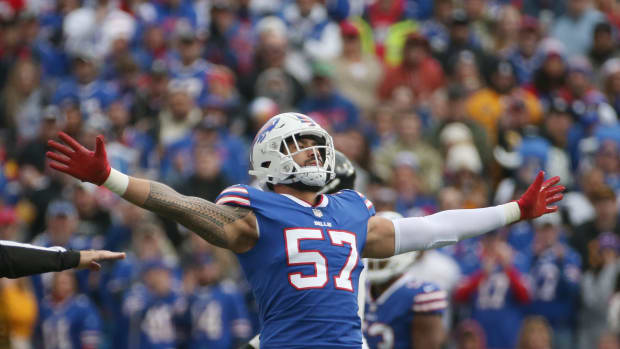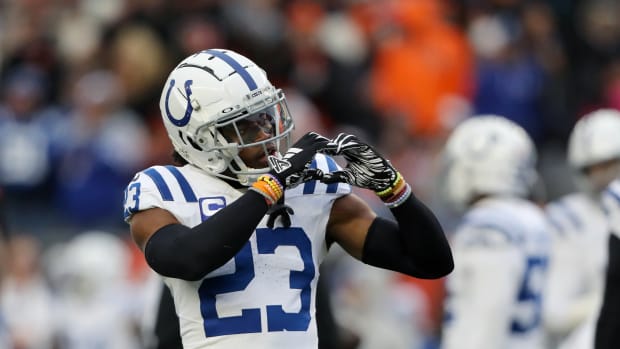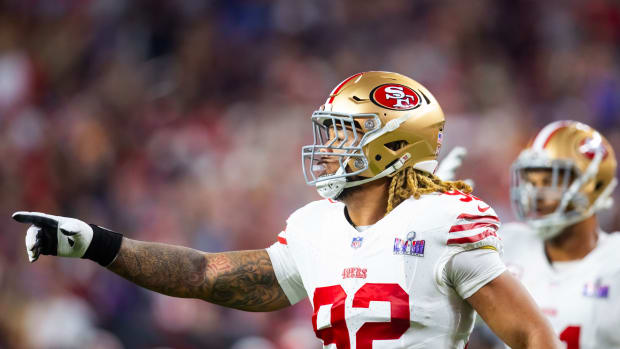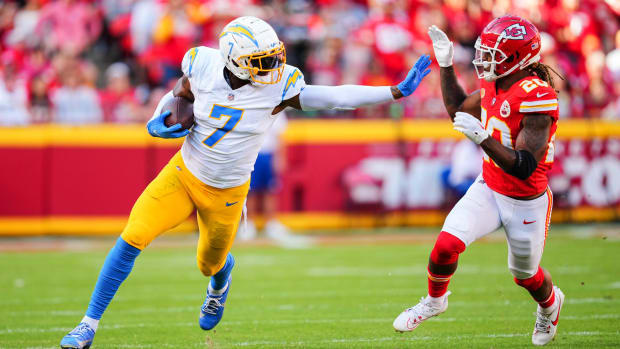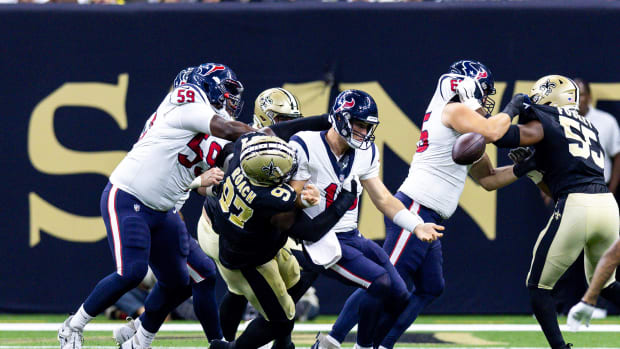It's Time for a Solution
The current disciplinary crisis in the NFL has created a we’re-making-it-up-as-we-go-along climate in a league beholden to tradition, custom and long-established practices. As an example, the Vikings and Panthers, with advice and consent from the league, found an inventive way to park Adrian Peterson and Greg Hardy on the “Exempt/Commissioner's Permission List” list, a category traditionally used for players coming off suspension, not going on paid leave. Even Ravens owner Steve Bisciotti, in discussing his previous options with Ray Rice, dismissed the commissioner’s exempt list with “They dusted that off.”
The present disciplinary abyss is troubling for a few parties: (1) NFL executives trying to fashion universal solutions while dealing with the crisis of the moment, (2) team executives wary of the league’s preferential treatment for certain teams and (3) players, agents and union officials wondering who can or cannot secure the full-pay “commissioner exempt deal” (and if that is even a thing).
Short-term solutions borne from crisis can have long-term consequences, especially for a business built on competitive balance. Clearly there is a need for reform.
Time for a Change
The issue at hand is not the punishment—or lack thereof—of any specific player. Rather, it is overhauling a haphazard and arbitrary player discipline system, and crafting a better one with evenhanded sanctions developed by experts.
Any system of player conduct has to be managed by and have full buy-in from both sides of the labor equation, the NFL and the Players Association. In his press conference Friday, commissioner Goodell offered an olive branch to NFLPA chief DeMaurice Smith to be part of the solution. That is certainly a positive development, even for a relationship defined in the past by a lack of trust, perhaps even dislike. Let us hope the news of the sides having (finally) agreed to drug policy revisions signals hope on a disciplinary policy.
The challenge, then, is to create a system that answers current questions on the league’s selective and uneven discipline, and restores confidence and trust in the NFL product.
Challenge accepted. Here are my thoughts…
The Problem
Simply put, no one knows what to do. In announcing Greg Hardy’s “paid leave” last week, Panthers general manager Dave Gettleman—a 30-year veteran in NFL team management—admitted “there’s no playbook” and joined a chorus of other coaches and team executives proclaiming, We’re doing the best we can! Perhaps it is time to bring in the right people and relieve the football people of this duty.
The MMQB on The NFL's Mess
The latest from Peter King, Andrew Brandt, Don Banks and others on a tumultuous time in the NFL. FULL STORY
Punishment and rehabilitation for off-field misbehavior is something neither the NFL nor its teams has the proper tools and skill sets to accomplish. In the present scattershot approach, teams handle misconduct differently, with most simply deferring to the commissioner. They’re essentially saying,
Let Roger handle it.
Now, though, Roger is not going to handle it.
In my experience with player discipline, we had no game plan or defined criteria. I invoked the catchall CBA discipline of “conduct detrimental” (CD) a few times to loop in misbehavior which, compared to today’s news, was benign: insubordination to a coach, leaving a preseason game at halftime (the players were caught teeing off on a golf course while the game was in the third quarter). Most teams, however, shy away from CD discipline due to the inevitable grievance it provokes (team discipline, unlike league discipline, is appealable to a neutral arbitrator). And from a coaching standpoint, it becomes very hard to motivate a player to sell out for the team while in arbitration against it.
And, of course, teams have no idea as to what should merit discipline, undefined even in the NFL’s new domestic violence policy guidelines last month. Accused? Charged? Arrested? Indicted? And how to allow for “due process”? (More on this below.)
Goodell has recognized—or been forced to recognize—the need for a new disciplinary model. As for naming a new and different “czar” of discipline, to me it seems like an antiquated model, too wieldy a task to entrust to a single person. So what then?
The Panel
I would suggest a truly independent panel of dedicated professionals empowered by the NFL and the NFLPA to bring to bear varied and diverse backgrounds toward appropriate discipline and rehabilitation for each case.
The Conduct Panel (Panel) would first sculpt appropriate sanctions for different types of misconduct, architected from their combined experience and expertise in this area. Once proper discipline standards are created, such standards would be imposed uniformly, without regard to the talent of the player. Simply, the Panel would answer the call from teams and players for consistency of discipline, taking that role out of the ill-equipped hands of teams and the commissioner. Goodell’s “judge, jury and executioner” discretion would now reside with the Panel.
The fact that some of the Panel would come from outside of football is a good thing. This issue is bigger than football; its toxicity can spread.
Panel members, while perhaps having experience with these entities, would not have existing employment relationships with the NFL, NFLPA, any team or player agency. This would remove any appearance of partiality to a team or player and eliminate the need for recusal.
Panel member credentials would include backgrounds from certain careers: football playing, management and player representation; those who have dealt with offenders in the justice system; and those working in behavioral counseling and rehabilitative therapy. Panel members need not be familiar names; those groups are often more symbolic than impactful (what happened with that star-studded task force named following the Incognito-Martin affair?). There is no long runway here for ceremonial meetings at fancy hotels; the Panel needs to get to work.
Without attaching any specific names at this point, a template for the 10-member Panel would be:
- Two former NFL team employees, one from the player development side and one from the contract management side, bringing experience in player engagement and structuring disciplinary contract language;
- Two former player advocates, preferably one from the agent side and one from the NFLPA, bringing experience in protecting player interests from overreaching penalties;
- A former NFL player, a thoughtful and respected middle-of-the-roster player, bringing experience in player dynamics within a locker room;
- A former victim of abuse of a former player, bringing firsthand experience in dealing with anger management and domestic violence issues;
- A counselor in the domestic violence and assault area, bringing experience in managing violent behavior and anger issues;
- A probation officer, bringing experience in monitoring and supervising offenders post-discipline;
- A former judge in this area, bringing experience meting out justice on violent crimes against women and sexual assault.
- A labor arbitrator, bringing experience in labor-management disputes regarding employee conduct.
The fact that some of the Panel would come from outside of football is, in my mind, a good thing. This issue is bigger than football; its toxicity can spread. As for the recent NFL hires of domestic violence experts, they would certainly be a resource for the Panel but not part of it, as using current league employees or consultants detract from the Panel’s autonomy and impartiality.
Panel members would be vetted, interviewed and selected similarly to the way that the NFL and NFLPA select independent arbitrators: Both sides suggest names until a Panel of members accepted by both sides is formed. Panelists would serve a limited term—two or three years—with regular evaluations by the league and the union.
The Process
As noted above, with the stumbling personnel transactions of the past week, we need a new list. So let’s create this one: “Status Pending, Conduct” (SPC).
Teams would place players on SPC when made aware of a (police) reported incident, while they are “gathering information,” as they are now conditioned to respond. SPC can be the parking space for players in this transient state, as opposed to the present hodgepodge of action and inaction.
Placement of the player on SPC—removing him from the active roster—would face some resistance from teams, but if endorsed by NFL and NFLPA as part of the new policy, teams will follow. As for reported offenses triggering the use of SPC, they would certainly include misconduct alleging domestic violence and abuse, child abuse, sexual assault, violence against women, illegal possession or use of weapons, etc. And although the (now revised) drug policies address illicit drugs and DUI offenses, the Panel would consider the presence of drugs and alcohol in applying their standards.
Once placed on SPC, the power would shift to the Panel. The team would await further direction on rehabilitation and return to play. During the season, the Panel would be on-call to meet about SPC players as expediently as possible, with more timing leeway in offseason months. A player on SPC would not count on the active roster and would receive full salary for the time being, subject to potential recoupment as one of the Panel’s disciplinary options.
Rather than the commissioner's exempt list, SPC would be the designation for players like Peterson. (Charlie Neibergall/AP)
For those concerned about the hypothetical worst-case scenario—a star player being falsely accused of a listed offense, or even potentially set up in the days preceding a game—the Panel would be aware of that possibility as well. Within its on-call status in-season, it could mobilize for an immediate review to (1) allow a team to defer placement on SPC awaiting further information or (2) remove the player from SPC when exonerating information requires it. Again, the salient point is that the Panel is authorized to apply its collective expertise to act in areas formerly left to football operations with conflicted priorities.
Just as the NFL has implemented independent neurologists and trainers to remove concussion recognition and recovery decisions from team personnel, the same concept would apply to discipline. Independent review allows for prioritizing the best interests of the player, not the team.
The Discipline
As for potential discipline, the goal should be to fashion both punitive and rehabilitative measures to effect behavioral change. As with any discipline, it is never one-size-fits-all, but the Panel’s diverse points of view—both from inside and outside the insular world of football—would be entrusted to fashion appropriate penalties.
A personal thought on penalties: Contrary to my usual follow the money perspective, my experience—as both an agent and a team executive—is that what impacts players most is taking away what they do: play football. Whether due to injury or penalty, I have long noticed that a player prevented from suiting up feels like less of a person, often invisible.
I envision a centralized facility to rehabilitate NFL conduct offenders. Counselors, psychologists and perhaps former players would be assigned to assist and counsel. Were this facility in place now, it would be home to Adrian Peterson, Greg Hardy, Jonathan Dwyer, perhaps Ray McDonald.
Further, it is hard to reconcile putting players on the field soon after violent incidents. Although it’s not the most artful comparison, police officers accused of wrongfully discharging their weapon or even shooting an innocent person are taken off the force—turning in their gun and badge—pending investigation. In the NFL, a player with a fresh incident, such as Ray McDonald of the 49ers, would be removed from play and placed on SPC to await a course of action from the Panel. The Panel could say that the player can return immediately, but it is their call, not a team decision.
As to the inevitable cries for “due process,” the NFL concept of due process has now been exposed as selectively and inconsistently applied, often based on the talent of the player. If we are serious about an evenhanded disciplinary model, due process would come from the Panel, not from the league or its teams.
The Facility
When I was with the NFL’s World League (as general manager of the Barcelona Dragons) we would send injured players to a central facility in Birmingham, Ala., for surgical procedures and recovery from league-hired trainers and rehabilitative specialists.
I mention that as I envision a similar centralized facility to rehabilitate NFL conduct offenders as part of the new disciplinary policy. Counselors, psychologists and perhaps former players with no current team affiliation would be assigned to the facility to assist and counsel. The Panel would determine which players would be sent to the facility and for how long, with many, though not all, coming from the SPC list. While there, players would attend sessions together with players from other teams and, where appropriate, “civilians” from other occupations going through similar therapy.
The punitive measure of removing the player from the field would be paired with rigorous and intensive counseling, trying to effect change in a compressed time period. The centralized location would take the player out of his comfort zone—perhaps for days, weeks, or if necessary even months—to alter conduct and provide a road map for future behavior. Were this facility in place now, it would be home to Adrian Peterson, Greg Hardy, Jonathan Dwyer, perhaps Ray McDonald and perhaps others. Players would also be prescribed—or ideally, affirmatively request—follow-up visits in the offseason.
The MMQB on The NFL's Mess
The latest from Peter King, Andrew Brandt, Don Banks and others on a tumultuous time in the NFL. FULL STORY
Not only would the rigor of the facility have a deterrent effect, but it could help smooth the player’s difficult transition from the regimented structure of the NFL to self-managing life without others there to do so. I can further envision other uses for the facility: career counseling sessions, financial management seminars, and perhaps even concussion awareness and brain injury rehabilitation. The possibilities for this centralized facility are limited only by the imagination and negotiation between the NFL and NFLPA.
We are at a moment in time with discipline and rehabilitation in not only the NFL but all sports (NBA, NHL and MLB have all stated in the past week that they are looking to upgrade their policies). Hopefully these ideas foster discussion towards a potential NFL road map, transitioning from Roger will handle it to a more consistent policy geared less toward punishment and more towards behavioral change. The issue has become too wieldy for Goodell and too conflicted for the teams. It is time for a dedicated effort blessed by the league and its union.
Although a private (and tax-free) corporation, the essence of the NFL business is integrity and public confidence in the product and its leadership. Trust has been shaken; these steps are a suggestion to help restore it.



































